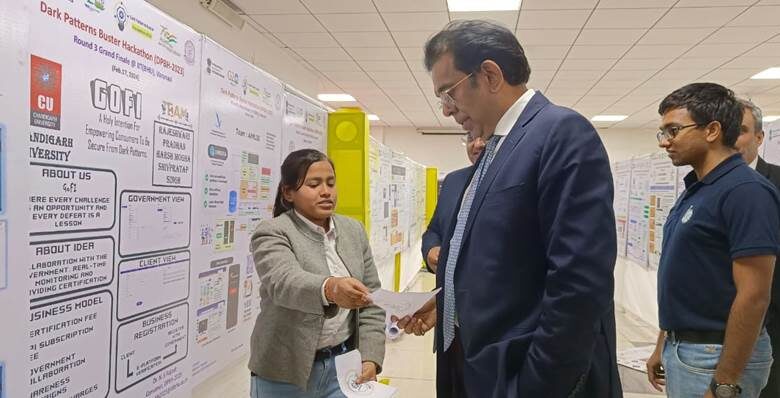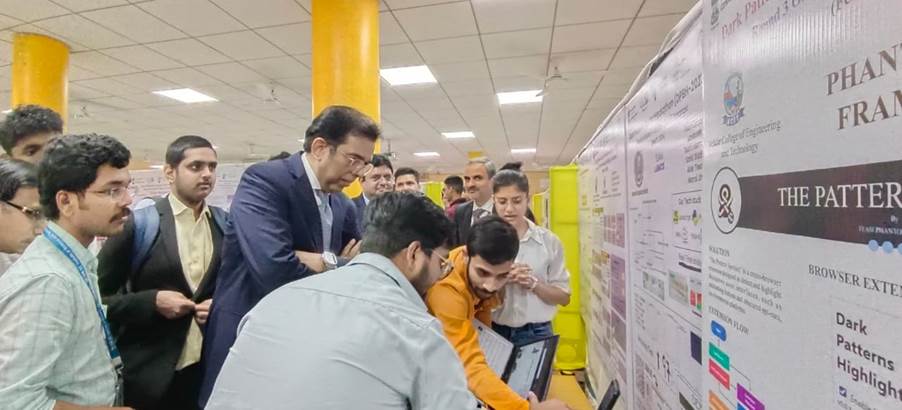Dark Patterns Buster Hackathon 2023 Wraps Up with Grand Finale at IIT (BHU), Varanasi

In a landmark event aimed at combating deceptive online practices, the Indian Institute of Technology (BHU), Varanasi, recently hosted the Grand Finale of Round 3 of the Dark Patterns Buster Hackathon 2023 (DPBH-2023). Organized by the Department of Consumer Affairs, Government of India, in collaboration with IIT (BHU), the hackathon attracted over 500 students from 50 premier engineering colleges, including IITs and NITs, along with 150 subject experts and jury members.
The DPBH-2023, initiated on October 26, 2023, as part of the government’s ongoing efforts to tackle deceptive online practices, garnered nationwide attention and participation. The event, chaired by Rohit Kumar Singh, Secretary of the Department of Consumer Affairs, witnessed an impressive array of innovative projects designed to enhance digital transparency, empower users, and create a safer online environment.
Secretary Singh commended the students for their dedication and creativity in addressing the issue of dark patterns, emphasizing the potential of their solutions to revolutionize online consumer protection. He highlighted the importance of leveraging evolving technologies, particularly artificial intelligence, to combat deceptive practices effectively while upholding ethical standards.
The DPBH-2023 attracted significant interest, with over 150 colleges participating and more than 40,000 students registering for the intra-college competition. Following rigorous scrutiny, 380 teams advanced to the second round, from which 172 teams were shortlisted to compete in the Grand Finale held at IIT (BHU).
During the event, each team presented real-time working models capable of detecting various types of illegal dark patterns identified by the Government of India. The projects showcased a diverse range of technological innovations, including:
- Large Language Models for Dark Pattern Detection: Introducing a browser extension utilizing an indigenously developed Large Language Model (LARA), optimized with Low-Rank Adaptation (LoRA), for precise detection of dark patterns on e-commerce sites.
- Serverless Architecture for Real-time Analysis: Implementing a serverless setup with AWS Lambda and machine learning models to enable multi-lingual analysis, showcasing scalability and efficiency in identifying deceptive practices.
- Modular Approach for Comprehensive Protection: Integrating text and visual analysis with YOLO technology and React for real-time alerts, prioritizing user privacy while tackling a wide range of dark patterns.
- Web and Mobile Platform Solutions: Utilizing classifiers and Google’s Vision API to uncover hidden information, presented through a user-friendly platform enhanced by a chatbot for simplifying privacy policies.
- Browser Extension for Enhanced Transparency: Focused on detecting fake reviews and false urgency, employing JavaScript, HTML, CSS, and Python, along with machine learning for data analysis.
These projects not only alert consumers about specific dark patterns but also provide real-time data to the government and identify emerging deceptive practices, aligning with the overarching goal of the hackathon to combat dark patterns.
The DPBH-2023 received widespread acclaim, with the efforts of the participating students recognized globally. In a webinar organized by the United Nations Conference on Trade and Development (UNCTAD) on “AI and Dark Patterns,” the students’ contributions were applauded, further highlighting the significance of the event on the international stage.
The conclusion of the hackathon will be marked by the declaration of awards and cash prizes on March 15, 2024, World Consumer Rights Day. This celebration will recognize the achievements of the participants and continue to champion consumer rights in the digital era.
Dignitaries present at the event included Professor MK Meshram and Professor Vikas Kumar Dubey from IIT (BHU), along with Anupam Mishra, Joint Secretary in the Department of Consumer Affairs, and Dr. NS Rajput, the convener of DPBH-2023 and Associate Professor at IIT (BHU).





